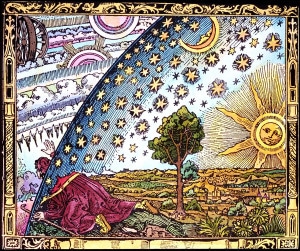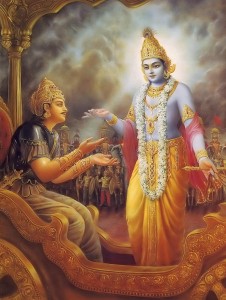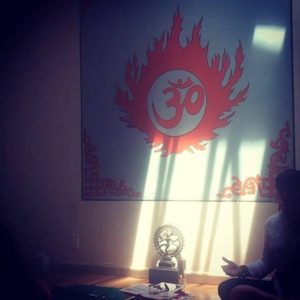You will find that intention on liberation is the means to it. When this intention is full no other means is necessary. But when intention is weak what is the use of a thousand means? Therefore the principal means to liberation is intention alone.”
– Tripura Rahasya. (date unknown)
There is an interesting story of King Janaka, who was on a quest for enlightenment and who makes an appearance in many Vedic legends. King Janaka wanted to learn meditation so he put himself under the tutelage of the unlikely guru, Ashtavakra. Ashtavakra, whose name means “eight twists,” was a disabled boy, a young teenager, with eight different crippling conditions in addition to being a dwarf. Nevertheless he was an illumined sage and his Ashtavakra Gita contains some of the most beautiful and bracing teachings on non-duality.
So Janaka complains that he can’t seem to still his mind in meditation, he’s all ADD, can’t get himself to focus, and is about to give up trying. Ashtavakra tells the king he has a solution, but that Janaka must give him full and binding authority over the royal bodyguards to do it. So the king agrees.
Ashtavakra tells the guards to fill a bowl of water and to place it atop the kings head. When that is done, he tells the king all he has to do is go for a walk outside to the market square and then return, without spilling a drop of water. Just as Janaka is about to embark, Ashtavakra tells the guards “If he spills a single drop, cut off his head.”
Under the threat of death, Janaka’s concentration is so absolute that he makes the journey to the market and back without spilling a drop. Then Ashtvakra asks “So how was the market today? Did you smell the delicious aromas at spice stalls? Did you see the fabrics on sale or hear the political debates – and how about those musicians and dancing girls?”
Janaka of course replies that during those few minutes he was aware of only one paramount intention: sustaining the integrity of his posture so as not to spill a drop of water. One reason I like this story particularly is that maintaining the crown of the head in parallel with the sky does facilitate meditative absorption. When a person’s life depends upon his focus, there is no faltering of attention, no ADD. That intensity of purpose can be harnessed effectively to the goal of liberation.
My Guru often used a phrase that never failed to make me uncomfortable: “Reach for the highest goal.” This would worry me, as I am drawn to ease and relaxation. I was never particularly ambitious and “the highest” in any endeavor was not a goal I considered attainable. The idea suggested to me relentless struggle and uphill effort – and I don’t even like hiking. It was only in time that I would discover that yoga is an easeful means of yoking any simple daily action to the supreme objective of spiritual liberation. It was through reading the Bhagavad Gita that this understanding of the yoga of action became clearer.
The Bhagavad Gita is a central text of Hinduism and of Yoga. The action takes place on a battlefield and concerns the conversation between a warrior, Arjuna, and his charioteer, the divine incarnation called Krishna. Right there in the midst of the life and death conditions of a battlefield, Krishna teaches Arjuna the skill of yoga. Perhaps the urgency of the battlefield is a perfect place for spiritual practices. Krishna explains that yoga is not an endeavor confined to a certain time or space but something that is practiced with every action. He explains that yoga is a kind of orientation toward action in the world.
Krishna uses the word “yukt” which means yoked, united, and it is the root of the word “yoga.” And Krishna says that a person’s everyday acts can be yoked or harnessed for the goal of enlightenment, if the act dedicated with love to the higher power. For me this means a small and virtually effortless shift in my sense of motivation when i do things. I can arise in the morning and mentally dedicate my actions to the good of the universe. When you brush your teeth, when you prepare your breakfast, when you bathe or get dressed, or do the dishes, any of these things can be offered as a kind of service. Taking care of your own needs upholds the dharma, the order and harmony of the world. Even taking a breath, if done with love, can be yoked to the purposes enlightenment and to the betterment and beautifying of our world.
In Tibetan Buddhism there is a breath awareness technique called Tonglen: In the practice, one visualizes taking into oneself the suffering of others on the inhalation, and on the exhalation giving happiness and success to all sentient beings. Through a small shift of intention, the act of breathing becomes a vehicle of liberation from the bondage of selfish ego, and you find that just by breathing, you can be reaching for the highest goal.
In hatha yoga practice, enacting a series of postures named for animals is a way of awakening the reptilian and limbic (mammalian) aspects of the brain, and of yoking those elemental drives to our ultimate purposes. These atavistic poses safely and satisfyingly disinhibit the potent will of the animal nature. A good hatha yoga session gets our brain and nervous system into alignment so we can harness the passionate vitality and attention inherited through evolution. This means that we can bring that sense of urgent motivation and primal desire to the yoga path.
The language of yoga, with its emphasis on wheels, ploughs, cows, dogs, and so on, suggests its origins in the agricultural phase of history in which the domestication of animals conferred energy benefits that allowed for the more complex endeavors of civilization. Similarly, tantric philosophy, which is at the root of hatha yoga, engages the veneration of nature, the husbanding of earthly principles, as a way of harnessing natural intention to obtain spiritual goals. This is an attractive alternative to spiritual systems which espouse the repression, suppression or denial of these aspects of our nature.
Patanjali in the Yoga Sutra said: “Attainment is near for one who applies oneself intensely. Because of degree of mild, moderate or extreme intensity, there is also the difference in attainment. Or, attainment comes from total dedication to God.“
(Yoga Sutra 1:21/22/23)
Upon arrival in 1977 at Sri Gurudev ashram in Ganeshpuri, India, for a prolonged and intensive experience under the guidance of my guru, I was first taken in to a private introductory interview with one of the highly venerated swamis in residence. He told me that the ocean of karma each soul possesses is so vast that in any given lifetime only a teaspoon of that karma could be experienced, and that one was therefore destined to live uncounted trillions of lifetimes to exhaust it all. The extraordinary good fortune of having the karma to meet a master and to be instructed in liberation was an opportunity that may not come again for countless eons. It was not just his total conviction but also the transmission of his state that set me afire with “mumukshutva” — the burning desire for liberation.
The intent for liberation, as with most evolutionary transformation, is ultimately motivated by the constant pressure of suffering. We all have suffering, some more dramatically than others, but we all suffer wretchedly from the dread knowledge of our own and of our loved one’s mortality. An unflinching acknowledgement of mortality for some is impossible and for some is a reason for nihilism, but it is the great friend of spiritual process. As Samuel Johnson put it: “Depend upon it, Sir, when a man knows he is to be hanged in a fortnight, it concentrates his mind wonderfully.”
Liberation is of the realization that there is nothing to get here: in the universal casino all the players eventually break even. Sacrificing the notion of gain and loss is the true sacrifice and the beginning of freedom from fear, and that realization is a cautery, the circumcision in the spirit. This understanding does not bring apathy, but instead a cosmic zest for love, joy and service.
One finds that saturating the heart with love drives out the hell of anxious fear, so the seeker finds a representation, an object to adore and worship, any “ishta deva” you choose, and commences to pour the entirety of love to that object, offering every act to it/him/her, and practicing self obliteration in the arms of the beloved during meditation. As you love, the love flows through you: it isn’t static but feels like an internal river of light pouring in spate and lapping at the boundaries of your soul. Love really is eternal life.
Immersing oneself in love is immersing oneself in God, who is eternal. This is what is known in various mystical traditions as eternal life or immortal elixir and sometimes goes by the name of “crossing over”:
My soul is afraid; to whom should I complain?
– Shri Guru Granth Sahib: Raag Dhanaasaree
I serve Him, who makes me forget my pains;
He is the Giver, forever and ever.
My Lord and Master is forever new;
He is the Giver, forever and ever.
Night and day, I serve my Lord and Master;
He shall save me in the end.
Hearing and listening, O my dear sister, I have crossed over.
O Merciful Lord, Your Name carries me across.
I am forever a sacrifice to You.
The name of God, mantra repetition, or japa and kirtan, these train the mind into one-pointedness and it is the keenness of the attention, the love and reverence, with which one inwardly repeats the mantra or chants the name that gets him or her across. A spiritual practice bears results according to the kind of feeling you can muster to apply to it. The more total focus and love you summon the faster is the transition into the sensation of infinity that feels like, that tastes of, the nectar of immortality. It is the deep and acute intention, not the form of the god or of the mantra or of the specific practice, that is the raft that crosses the soul over to the infinite. The intentional, critical focus on the mantra or the practice is as important as the emotion with which it is performed. Like Janaka in the market place, one should practice one’s yoga as if one’s life depends on it, which arguably it does.
Kabir (1440-1518):
Friend, hope for the Guest while you are alive.
Jump into experience while you are alive!
Think . . . and think . . . while you are alive.
What you call “salvation” belongs to the time
before death.
If you don’t break your ropes while you’re alive,
do you think
ghosts will do it after?
The idea that the soul will rejoin the ecstatic
just because the body is rotten—
that is all fantasy.
What is found now is found then.
If you find nothing now,
you will simply end up with an apartment in the
City of the Death.
If you make love with the divine now, in the next
life you will have the face of satisfied desire.
So plunge into the truth, find out who the Teacher is,
Believe in the Great Sound!
Kabir says this: When the Guest is being searched for
it is the intensity of the longing for the Guest that
does all the work.
Look at me, and you will see a slave of that intensity.











My thoughts on the mnaieng of sacrifice:Sacrifice, etymologically, is to make holy. To take a part of my life that was automatic and to voluntarize my actions in that arena in dedication to, for example, the Absolute, is to sacrifice.But immediately I notice that that definition is not broad enough. It does not encompass the sacrifice of comfort, since I was not able to voluntarize that transformation, as E.J. points out.Let me try again.To sacrifice is to convert the mode of a repeated action or set of actions so that it is performed as though in dedication to something infinitely higher.This definition doesn’t require that the seeker voluntarize the sacrifice.The definition covers cases in which the conversion is mechanical, performed in relation to guidance by the teacher, perhaps even with selfish aims in mind. In other words, it is broad enough to cover the sacrifice of comfort.It also doesn’t specify the infinite being by name.It also doesn’t specify that an infinite being exists.Rather, it talks about a change from action that formerly could only be described as selfish to action that now appears as though it is a selfless offering to an infinite being, even if it is not.If something like this is correct, it means that an entity whose actions are, at present, thoroughly mechanical, is still capable (with help) of making a sacrifice. This is beautiful. This is a miracle.Eric